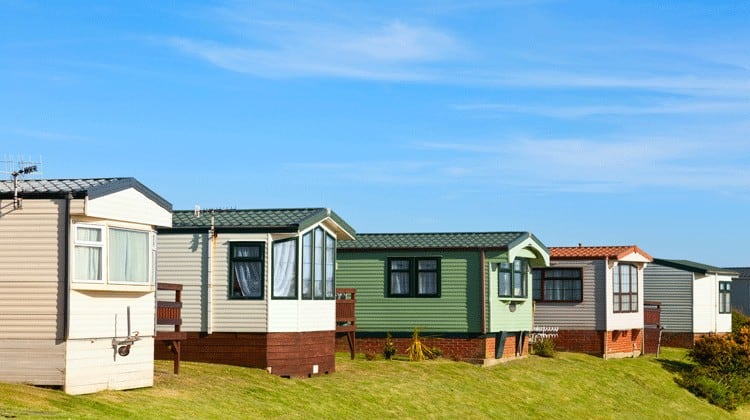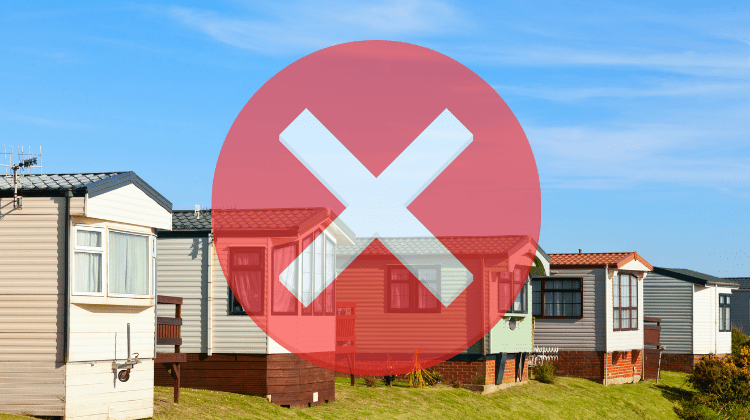THIS POST MAY CONTAIN AFFILIATE LINKS. PLEASE SEE MY DISCLOSURES. FOR MORE INFORMATION.
Are you considering buying a mobile home?
If so, you’re not alone.
More and more people are choosing to purchase mobile homes, for a variety of reasons.
But before you make the leap, it’s important to weigh the pros and cons of living in a mobile home.
In this post, I’ll take a look at some of the most important benefits and drawbacks of this type of housing so you can decide if it’s right for you.
Table of Contents
13 Pros And Cons Of Living In A Mobile Home
Mobile Homes vs. Manufactured Homes
You might hear some people talk about mobile homes and manufactured homes in the same sentence.
While confusing to some, they are very similar.
Both are built in controlled environments like factories, and then taken to where they will be placed.
They are not built on site like a stick built home.
In many cases, they use tie downs to hold the home in place as opposed to using a foundation.
The biggest difference is when they were built.
According to the Department of Housing (HUD), a manufactured home is a factory built home after June 15, 1976 and a mobile home is factory built before this date.
Now that you know these terms can be used interchangeably, let’s get to the reason why you might consider this strong favorable alternative to a traditional home.
7 Pros Of Living In A Mobile Home

There are many mobile home pros.
Here are the biggest ones you need to know.
#1. Cheaper Than Traditional Home
As of this writing the average price of a mobile home is roughly $81,000 and a traditional home is $408,100.
This is a huge difference in price and you can see why many people are thinking more about mobile homes.
Just saving for a down payment on a stick built house will take the average person years.
And if you are putting 20% down, that is the entire cost of the mobile home.
Because of this, mobile home ownership continues to rise in popularity as a cost effective alternative to stick built homes.
- Read now: Learn how to buy a house without a mortgage
- Read now: Find out how to save for a house while renting
#2. Afford Many Features
Related to the point above, you might want a house with 3 bedrooms, a nice sized yard, and even a garage.
A house with all these features might be out of your price range in some areas, so you have to pick and choose.
Which is more important to you, and which ones can you go without?
With a manufactured home, you don’t have to make this tough decision.
You can typically get all these features and still have enough money for the home in your budget.
#3. Low Maintenance Costs
Newer mobile homes are built using the same standards as stick built homes, so they are energy star certified, helping you to save money on your energy bills.
But unlike traditional homes, plumbing and sewer line fixes are rare.
And in the event you need to have work done, it is usually much less expensive since there is very little digging in the ground.
Most of the pipes can be accessed through a crawlspace as the home sits on a concrete foundation.
#4. Live In High Cost Of Living Area
In some parts of the country, the cost of living is out of control.
Traditional homes in San Francisco for example will run you at least $1 million dollars.
And renting a studio apartment in New York City will cost you a few thousand dollars a month.
For some people, these prices make living in these areas out of reach.
But with a mobile home, you can still live in these high cost of living areas.
This is because mobile homes are more affordable and they tend to be just outside the large metropolitan areas, where it is less expensive to live.
#5. Perfect Transition Home
If you buy your own property and want to build a house on the land, where are you going to live during construction?
If you don’t already own a home, you are going to have to pay rent for a place to stay.
Another option is to place a mobile home on the property and live there.
- Read now: Learn the pros and cons of buy vs. rent
This saves you in rent money and it protects your new construction since these sites tend to have theft and other crimes occur there.
It also is a benefit if there are construction delays, which are more common than you think.
If you are renting and your lease ends but your new home isn’t completed yet, you are going to have to find another temporary housing solution.
With a manufactured home, you can stay until the home is complete.
#6. Lower Taxes
A mobile home is considered personal property and not real property like a house.
This is mainly due to the fact that you can move a mobile home but you really can’t move a traditional home.
As a result of this distinction, property taxes are much lower on mobile homes.
This can be a huge savings, especially if you live in an area where property taxes are high.
- Read now: Learn the tax strategies the wealthy use
- Read now: Discover the difference between tax credits and deductions
#7. Can Be High End
Mobile homes have come a long way.
You can outfit your home with granite countertops, energy saving appliances, double bath vanities and more.
You can even customize the floor plan to exactly how you like it.
If you need more room, you can easily add on making it a double wide, for a fraction of the price it would cost you to add on to a stick built home.
Not only would you not have to worry about the difficulty scheduling subcontractors, but the zoning requirements are going to be less of an issue as well.
6 Cons Of Mobile Homes

For all the benefits mobile homes offer, there are some drawbacks.
Here are the ones you need to consider before you buy.
#1. Different Type Of Financing
As mentioned before, a mobile home is considered personal property so you aren’t going to be able to get a traditional mortgage loan for it.
You will have to get a personal property loan, also known as a chattel loan, or a personal loan.
The issue with these loans is that some aren’t offered to mobile homes in a trailer park.
- Read now: Here is a beginner’s guide to personal loans
- Read now: See the best alternatives to a personal loan
Others only offer financing for people living in certain areas.
The other downside is that in some case, they can take a long time to close.
The good news is chattel loans allow for most any credit score to qualify and the interest rate offered is reasonable.
Just understand that these loans do carry higher interest rates compared to a mortgage and the term is much shorter as well.
#2. Renting Land Is A Possible Cost
If you are parking your mobile home in a trailer park, make sure you first understand the park rules.
This includes if you need to pay rent for the land you are using.
Many mobile home communities require you to pay a monthly fee that covers the leased land you park your mobile home.
The good news is your lot rent usually also includes access to the various amenities the mobile home park offers as well.
This could be access to the swimming pool and playground.
Even with this extra monthly payment, it is still a cheaper alternative to a stick built home.
#3. Bad Stigma
Unfortunately, there is a bit of a bad stigma attached to living in a manufactured home.
This is especially true if you live in one that isn’t placed on land you own.
The image many people have of these homes are they are old, dirty and crime ridden.
If this concerns you, make sure the mobile home community you select is well kept.
Also, if you do live in a trailer park and own your home, you can take measures to make it look like a regular home by adding on or making other changes.
But it is something to consider before making your purchase.
#4. Limited Layout Designs
Another drawback of mobile homes is the layout is basically the same, a long rectangular living space.
While you can customize the interior to your liking, the reality is you can’t change the footprint of the home.
This is in contrast to a stick built home which can have any layout you want.
#5. Depreciates In Value
While stick built homes appreciate in value, manufactured homes tend to depreciate in value.
This is because they are personal property.
So just like over time your new car loses value, so too will your mobile home.
This drawback is significant as many people use the equity they build in their homes to help them fund their retirement.
With a mobile home, you don’t have this option.
The good news is they don’t depreciate quickly, only around 3% a year, so while it is something to consider, it shouldn’t be the reason you rule it out.
#6. Can Be Hard To Sell
Finally, mobile homes can be hard to sell.
First you have the depreciation factor, with many sellers thinking their mobile home is worth more than it actually is.
Then you have the stigma of manufactured homes to deal with as well.
You also might have a buyer interested in your home, but they want to move it.
This significant cost could cause them to back out of a deal.
Because of these factors, mobile home sellers need to be open to a harder time disposing of the property.
Final Thoughts
There are the biggest pros and cons of living in a mobile home you need to consider.
While there are some great benefits, there are also drawbacks you have to consider.
By looking at the complete picture and your own specific housing goals, you will know if this is a housing option for you and your financial situation.
- Read now: Learn how to survive on $1,000 a month
- Read now: Use these tricks to help you win the lottery
- Read now: Discover what to do if you can’t afford Christmas gifts
I have over 15 years experience in the financial services industry and 20 years investing in the stock market. I have both my undergrad and graduate degrees in Finance, and am FINRA Series 65 licensed and have a Certificate in Financial Planning.
Visit my About Me page to learn more about me and why I am your trusted personal finance expert.
